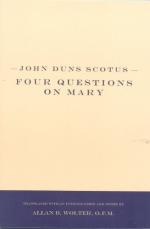|
This section contains 12,779 words (approx. 43 pages at 300 words per page) |

|
SOURCE: Boler, John. “An Image for the Unity of Will in Duns Scotus.” Journal of the History of Philosophy 32, no. 1 (January 1994): 23-44.
In the following essay, Boler concentrates on Scotus's moral theory of dual affectiones (basic inclinations toward happiness and justice) and the relationship of this duality to the philosopher's understanding of the underlying unity of will.
Scotus adopts from Anselm the terminology of two “affections of will.”1 The affectio commodi and the affectio justitiae2 are basic wants or inclinations in rational agents, postulated to explain (a) severally, the various wants such agents have, and (b) in combination, the unique character of “rational appetite” (i.e., will) in a moral context.3 The framework of the present article, however, is a restricted one: to examine the problem of the unity of a will with more than one inclination. And even within that context, my present purpose is quite specific...
|
This section contains 12,779 words (approx. 43 pages at 300 words per page) |

|


